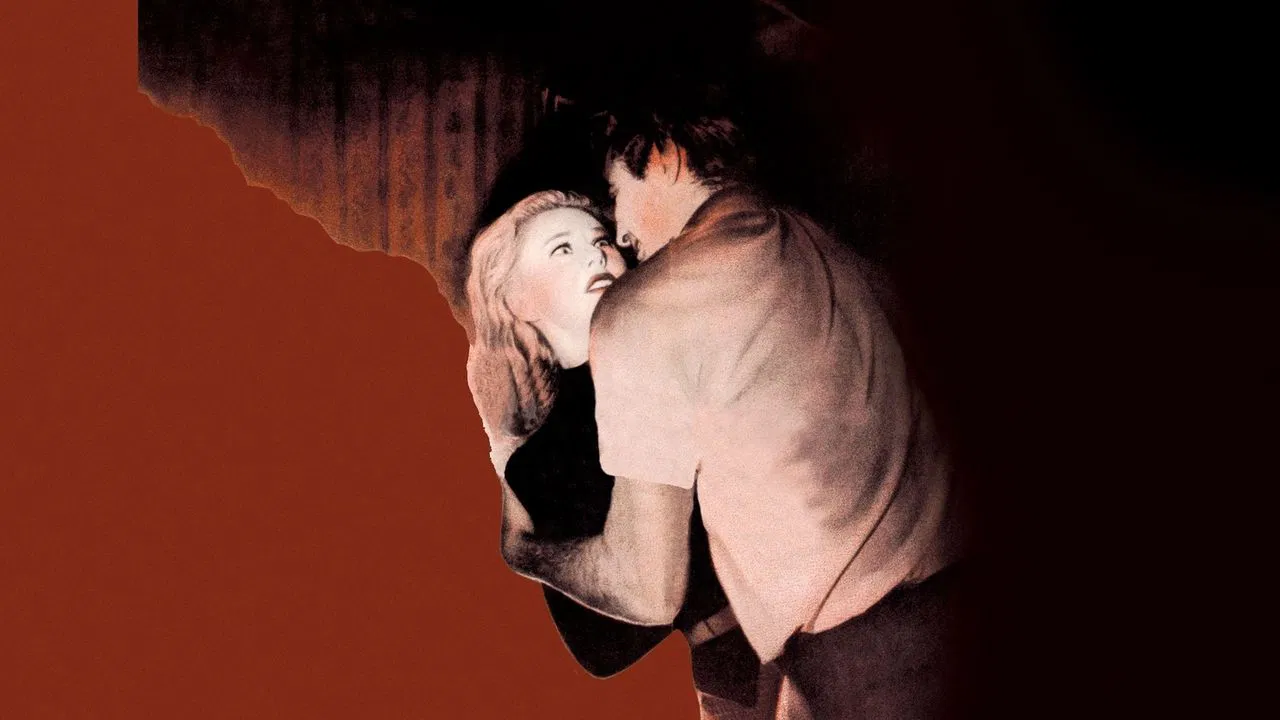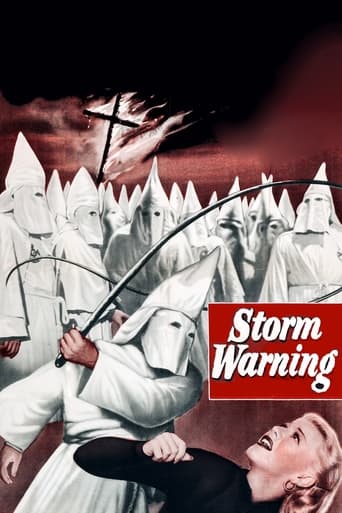

Ginger Rogers and Doris Day are believably cast as sisters in Storm Warning. Steve Cochran plays one of his usual shady characters. And Ronald Reagan appears in his last picture for Warners as a prosecutor who saves the day.The subject matter is rather dark. It's a story about Civil Rights and the Ku Klux Klan. Shot in black and white photography, the film's noir aspects are gripping to say the least, and aside from a somewhat melodramatic ending, the film has a fair amount of social realism in it.Originally Jack Warner wanted Joan Crawford to do this picture at the end of her contract. But she told him that nobody would believe she was Doris Day's sister.
... View MoreStorm Warning is directed by Stuart Heisler and written by Richard Brooks and Daniel Fuchs. It stars Ginger Rogers, Ronald Reagan, Doris Day and Steve Cochran. Music is by Daniele Amfitheatrof and cinematography by Carl E. Guthrie. Stopping over to see her sister in Rockpoint, model Marsha Mitchell (Rogers) witnesses the Ku Klux Klan committing a murder and sees two of the perpetrators with their hoods off. Upon arriving at her sister's house, she is stunned to find that the beau of Lucy's (Day) life is one of the killers! Should she do what is morally right? What District Attorney Burt Rainey (Reagan) wants her to do? Or should she think of her sister and keep Hank Rice (Cochran) out of prison? Lets get the big complaint out the way first. What has been written before is true, the issue of race hatred and the KKK is not dealt with, this really does soft soap that particular issue in favour of a more - less - controversial angle. Film does still portray them as cowardly murderous thugs hiding behind hoods, even portraying them as dimwits following one almighty Grand Wizard (or is it Dragon?) who is more concerned about cash than colour of skin, but trivialisation of a hot topic occurs. We are the law here. The judges and jury! So, accepting it on its own "non social issue message" terms, then it's a thoroughly engrossing piece of film noir styled melodrama. Thematic noir staples are within, with bigotry, fate, family dysfunction and a woman in peril scenario (the fox in the hen house situation is super) all bubbling away under the moral obligation surface. Laid over the top is no short amount of atmospheric style, as Heisler (Among the Living/The Glass Key) and Guthrie (Backfire/Caged) produce dank shadowed streets, misty jails and a big court room segment bathed in slatted shadows befitting the moral discord filtering around the room. Don't give me that Halloween routine. Heisler proves to have a good eye for imagery as well as technical nous, such as snaps of child Klan members or the symbolic falling of a burning cross. He also marshals his cast very well. Don't believe any review that says Rogers is miscast, she simply isn't, she's feisty, sexy and strong, yet vulnerable as well, she's perfect for the role that was originally intended for Bacall who bailed out. And with Day exuding a confused innocence that hits the right notes, Heisler's reputation as a great director of actresses holds weight here. Reagan and Cochran are fine, with Cochran veering away from his normal cool, calculated persona to offer up a characterisation we rarely saw from him. It misses a trick to really strike a dagger in the KKK scheme of things, and yes some of it feels like lower grade Tennessee Williams. However, the makers turn this Southern town into a diseased noir landscape, where the story is paced and performed with skill, and it all builds moodily to a truly great finale. Well worth seeking out. 8/10
... View MoreModel Ginger Rogers arrives in the small Sothrin town of Rockpoint from New York on a bus. She's going to visit her sister for the first time in years. The bus departs and Rogers finds herself alone in an unfriendly, night-time town that's filled with ominous shadows. She witnesses a brawl a block away. A dozen men in white pointed hoods are beating a man. She scurries into a dark nook and watches the man get shot twice. Some of the killers remove their hoods and she sees their faces, although they don't know she's there.She arrives shaken at his sister's house, Doris Day, and describes what she saw. Then Day's husband, Steve Cochran, walks in and she recognizes him as one of the men standing around the dead body. The beans are soon spilled.So here's the situation. A sophisticated woman visits her younger sister in a Southern town and is confronted by the brutal husband in a shabby flat. It's A Streetcar Named Desire, transfigured into a melodrama with overtones of social messaging.The social message is that the Ku Klux Klan isn't an admirable outfit. No blacks ever show up on screen but the murdered man is repeatedly described as a reporter from a Northern newspaper, down here just to cause trouble, and why don't they leave us folks alone? Ronald Reagan is stuck in the stock part of the upright District Attorney who can't get the local people to cooperate in the prosecution of these periodic murders. The natives agree with the Klan, are afraid to get involved, or don't care.It may be hard for younger viewers to see this as anything other than a fantasy, unless they've lived during the Civil Rights era when such things happened. (They happened for the next twenty years.) A lot of powerful symbols are flickering away on the screen but, lamentably, it's not a very good movie. The writing is clumsy and full of speeches. The behavior of some of the principles is idiotic. Why would Ginger Rogers, knowing that Cochran is a vicious murderer, shout at him so provocatively and tell him she's on her way to the DA to squeal on him? The photography is poor. The story isn't noir but the photography certainly is. There are about ten minutes of daylight. The direction by Stuart Heisler is pedestrian but there is an occasional nice touch, as when one of the Klansmen at a burning cross hoists his white-hooded child to his shoulder so he can see the ritual more clearly. The script preaches, and I've never liked being preached at because sermons seem to me to say, "You are stupid and I am trying to instruct you." I had all the scolding I could take during my marriage.
... View MoreGinger Rogers is going to visit her sister, Doris Day, who she hasn't seen in two years. When she gets to the small town at night, she encounters very anti-social people. A cab driver won't give her a ride, and shops are closing like there's a fire to go to. She barely got the clerk at the bus station to check her baggage, before he locked up. She had to walk ten blocks to Doris Day at her place of business, because of that....that cab driver. The roads and sidewalks are quiet and everything is deserted. She's walking in the dark, when she hears noises and fighting. A man runs by her and gets shot in the back. A group of people covered with hoods gather around the body, not seeing her, as she is hiding near by. Two men take off their hoods and she sees them. Then she comes to find out later one of them is her brother-in-law, Doris' husband, played by Steve Cochran.Such is the gist of her dilemma. Should she tell what she's seen of the Ku Klux Klan and Steve or stay out of it? Apparently, everyone else has. Ronald Reagen is the d.a. who's been trying to get the Klan run out of town ever since he's been elected. But no one ever remembers anything, knows anything, or has ever seen anything, which must make it very easy for them.This is a very well made film that shows Ronald Reagen and company at their best. Reagan gives a very understated and effective performance as not only a man of the law trying to do his duty, but as a man trying to get at the truth and trying to get others to see things as they really are. And, never at any time does the viewer feel that Ginger Rogers is out of her element, being in a controversial suspense film and not being in a light comedy/musical. While it's great to see Doris Day in something different than her usual fare, it still feels somewhat strange to see her perky and upbeat character in this sobering tale of hatred and bigotry.I was very impressed with this film, particularly as it neared its dramatic conclusion and how well it all came together, where much is expressed with little to no words. If you've never seen "Storm Warning." then you ought to see this intelligent film, that was ahead of its time. I liked and respected Reagan before I saw this, but after wards I think I've grown even more respect for a man who knew this was a project he wanted to be a part of. This may be only a movie, but as actors make choices as to what films to make, this certainly reveals Reagan and his conscience to stand for what is right.Discover "Storm Warning" and learn today that tomorrow can be better if we stand together against intolerance.
... View More